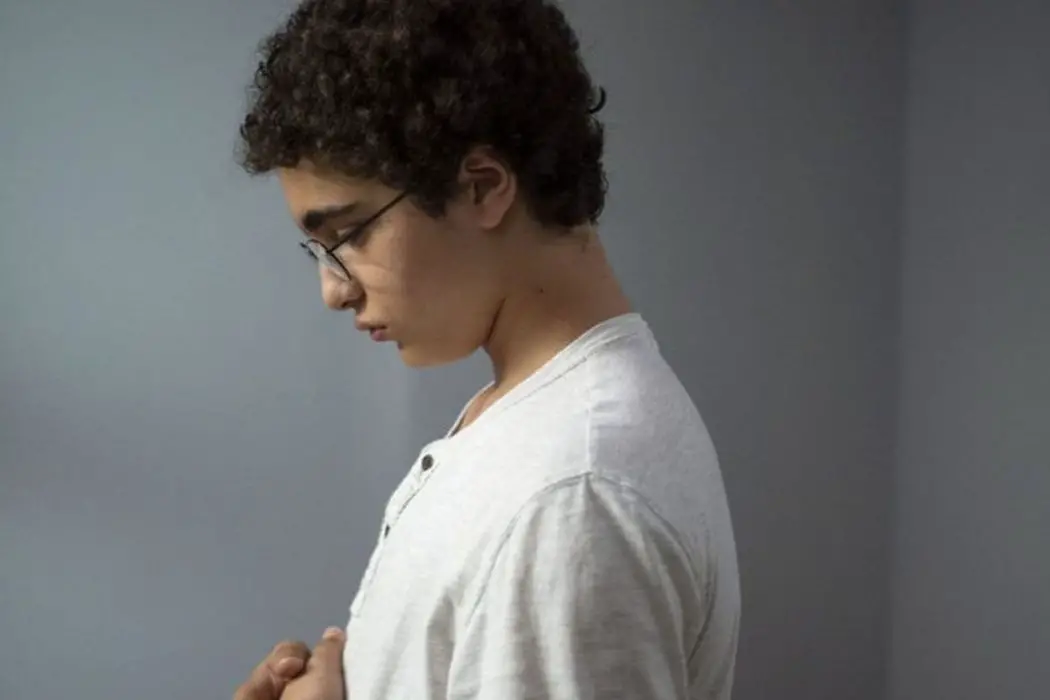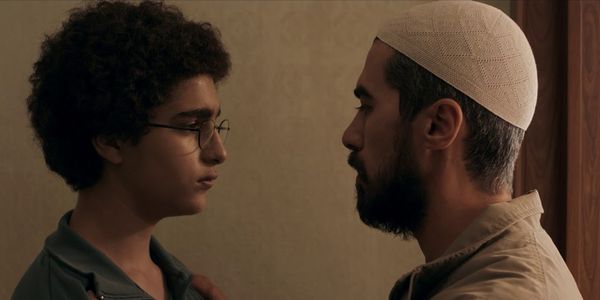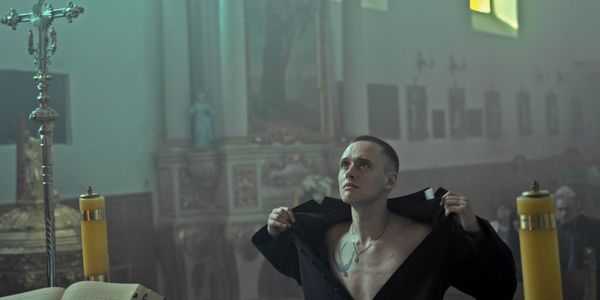Religion In YOUNG AHMED And CORPUS CHRISTI: Paths Of Light & Dark

Soham Gadre is a writer/filmmaker in the Washington D.C. area.…
It’s generally understood that as humans grow older, they increasingly start to think about their mortality. This, in turn, brings about more questions regarding one’s place in the world and whatever might come after it’s all gone. Religion by virtue of its quest to try and answer these questions can become a lot more appealing as one gets older. This certainly happened to my parents. Whether it’s for self-assessment, higher purpose or simply motivation, religion has been an emotional driving force for a lot of people that have wide-ranging interpretations and a large spectrum of effects on the greater humanity. The teachings of religion are never interpreted the same by everyone. Like a snowflake, it has minor and minuscule unique marks on the lives it connects to, for better and for worse.
Last year, two major European motion pictures released which centered on the ways religion penetrates the ideologies and fabrics of a person to change their lives and lead them down a unique path of self-reflection. There was major controversy regarding one of them – The Dardennes Brothers’ Young Ahmed – because it depicted the indoctrination of Muslim youth towards violence and jihad. It’s a touchy subject right now, resulting in racial and religious profiling and an unqualified fear – Islamophobia – among Westerners that is consistently being perpetuated by media outlets and fascist governments (and even some liberal ones). So it’s adequate that some felt the Dardennes’ movie was a ‘wrong place wrong time’ situation and ‘didn’t read the room’. Yet, when I watched it, I did not feel the movie consciously did any disservice towards Islam. In fact, the movie’s greatest strength was the Dardennes’ narrative abilities to discern and create an unmistakable contrast between the radical and non-radical interpretations of religion and normalize the tolerant beliefs of the average follower.
Youth in Religious Conflict
Young Ahmed centers on a pre-teen boy named Ahmed (an intimate and disquieting performance by Idir Ben Addi) who is being taught a radical interpretation of the Quran by Youssouf (Othmane Moumen), his Imam. His preparation for jihad is directed at revenge against not only non-believers but also the Muslims who do not follow an intolerant and orthodox version of Islam. Ahmed displays hostility and a silent but sharp anger at both his Arabic teacher (Myriem Akheddiou) and even his mother (Clair Bodson). He refuses to shake women’s hands, listen to music, and to engage in any sort of cultural activity that is deemed haraam. Underneath his militant façade is clearly a timid and dithering young boy who has lost his way.

What is stark about the Dardennes’ film is its empathy for Ahmed’s strict interpretation of Islam, understanding his devotion from a standpoint of discipline, ritual, and a near-saintly maintenance of purity – a decision that, when made from a personal and individual basis, can be quite wholesome even if others may not agree with it. The Dardennes’ intimate hand-held camera work with close-ups draws us into Ahmed’s conflicts, piercing through his lies and steadfast beliefs and uncovering the uncertainty that is characteristic of his youth. He performs traditional salat (prayer) five times a day and refuses the advances of a white girl who likes him, but he relents to these things in small steps, retracting and asking for forgiveness from Allah each time. Ahmed’s strict adherence to Muslim traditions is not a universal thing. It is an individual interpretation like all facets of “belief”.
What We Choose To Believe
The movie also clearly condemns religion’s broad ideological preaching and castigation of others. Ahmed is assigned by his Imam to stab and kill his Arabic teacher to death once the jihad begins. He doesn’t wait though, he tries one day after school but she fends him off. When he lands in a youth correctional facility he is allowed by the French warden to follow his religious routine of prayer and other rituals. We know early on that he is faking his “change in behavior” to get an early release, but as the days go by this change starts to take real effect. His rehabilitation is never fully complete, and his mission is so ingrained inside him that he goes to kill his teacher anyway.

Young Ahmed is at heart a coming-of-age story and like all coming-of-age stories, it examines our search for a path for oneself and the result of individual choices and mistakes. This is the heart of religious discussion which really makes the film shine – the idea that Islam, in and of itself, is not to be blamed for who Ahmed becomes but the mistakes he makes, the people he listens to and trusts all work as individual ingredients to his radical militant version of Islam that leads him to tragic self-destruction, re-evaluation, and possible redemption.
Playing the Role of Healer
Redemption is, in the end, the final goal of religion, but pasts are not so easily forgotten nor are the dark shadows of one’s regret so easily erased. Jan Komasa’s Corpus Christi begins in the same place where Young Ahmed drops us off – the turn towards forgiveness and redemption. Following Daniel’s (a fantastic Bartosz Bielenia) jail sentence and placement on parole, he ventures into a small Polish village to work in a steel mill. After a Chaplin-esque scenario gets him mistaken for a pastor, he decides that this could be both a path to freedom and a reconciling of his past.

Corpus Christi is a movie concerned with religion as a mode of forgiveness and sacrifice, a way of healing from the past. It doesn’t however naively believe that the past is erasable. The marks lay there forever. When Daniel discovers a tragedy and the deeply held ill-will of the village regarding a drunk driving crash that killed eleven people (including the driver), he comes at odds with the townspeople in his message to practice forgiveness. The Dardennes’ made it clear that the corruption and hatred that stems from religion comes from human fault – so does the hypocrisy, which becomes blatant in the decision of the townspeople to harass and excommunicate the wife (Barbara Kurzaj) of the drunk driver and refuse her husband a proper burial.
A Sacrifice for the Sake of Others
Similar to Tim Robbins’ Dead Man Walking, the film’s central conflict circles around religious duty and moral righteousness, but in this case, it’s concentrated more on the hypocritical nature of ‘belief’ itself. It becomes apparent that religion is ritual and procedure, a daily part of life that is no longer given any thought or purpose, but for the sake of fear of God – that if the ritual is not performed, there is some negative consequence. Daniel uses this argument during sermons to talk about how religion has become a meaningless set of traditions that in and of themselves call to no higher purpose. He preaches that while the people of the town may believe in God, they do none of his biddings, they know nothing of him and his work.
To confront the past and to win the fight over it is difficult and often a losing battle, but the past is malleable. Daniel’s past eventually comes back like a phantom disturbing his sleep. His lies and fake position as a pastor are found out and he knows he will eventually return to jail to face the consequences of what he left there. At the end of Corpus Christi, the film reaches levels of both cathartic highs and a difficult coming to terms with reality. The townspeople soften to the idea of burial for the drunk driver and give his wife some solace. Daniel goes back to jail, the effect he leaves in the town lingers on. Corpus Christi is the Latin term for “body of Christ”. It is inherently sacrificial, and the movie works with this metaphor to make its final point – that even if you must be dragged back to the darkest corners of a past you cannot mend, your may fulfill your purpose by helping others mend theirs.
Have you seen Corpus Christi or Young Ahmed? Let us know your thoughts in the comments.
Young Ahmed and Corpus Christi were released in U.S. theaters on February 21, 2019.
Does content like this matter to you?
Become a Member and support film journalism. Unlock access to all of Film Inquiry`s great articles. Join a community of like-minded readers who are passionate about cinema - get access to our private members Network, give back to independent filmmakers, and more.
Soham Gadre is a writer/filmmaker in the Washington D.C. area. He has written for Hyperallergic, MUBI Notebook, Popula, Vague Visages, and Bustle among others. He also works full-time for an environmental non-profit and is a screener for the Environmental Film Festival. Outside of film, he is a Chicago Bulls fan and frequenter of gastropubs.












